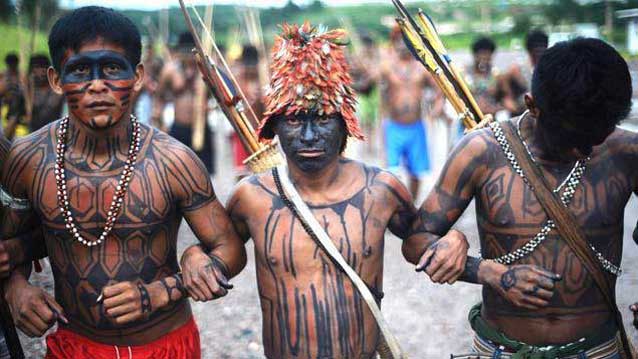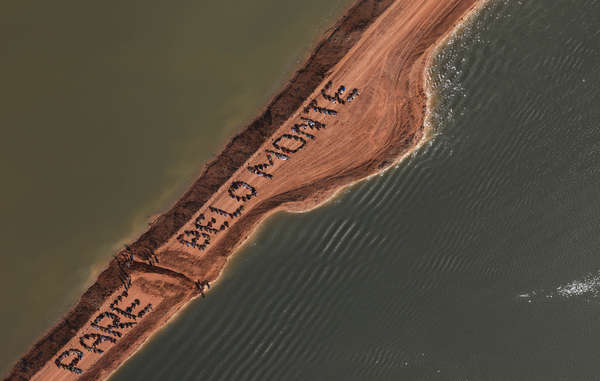Two Indigenous women, representing communities impacted by Shell’s operations abroad, will attend the AGM to confront the Chairman and Board over the massive human and ecological rights violations and economic devastation that the company’s operations bring to Indigenous communities. They will argue that Shell’s decision to pursue highly risky ‘extreme energy’ projects, like Arctic drilling and Canadian tar sands, will have little long term benefit for the company, and expose it to both reputational damage and political risk, including litigation.
One of the communities represented, the Athabasca Chipewyan First Nation (ACFN), which resides downstream from tar sands operations, is currently suing Shell for violating past agreements that have threatened their treaty rights. The community is also actively opposing two new tar sands mines Shell is proposing to develop on their land. For more details, watch the powerful film above. Legal challenges by other First Nations against tar sands extraction on their traditional territories is also increasing.
Eriel Deranger, community member and spokesperson for ACFN, states:
“Shell’s current and proposed tar sands projects violate terms of our treaty, destroy our land and contaminate waters critical to our survival. The ACFN leadership has made a commitment to protect our lands, rights and people currently being threatened by tar sands development. We have tried exploring amenable agreements and options with Shell only to be disappointed by their inability to compromise and adjust proposed plans to adequately work with us which has led and continues to lead toward litigation. Our culture, lands and rights can no longer stand for unabated and irresponsible development of tar sands in the region by Shell or any operator.”
Shell is also under fire for its Arctic operations. The company has spent $4.5bn securing permits to drill in Arctic waters. However it has been proven incapable of operating in the area and has had to suspend its plans for drilling this summer.
Mae R Hank, tribal member of the Native Village of Point Hope, Alaska, said:
“The Beaufort and Chukchi Seas are critical to the Inupiaq culture and traditions, and provide a vital habitat for the endangered bowhead whales, beluga whales, polar bears, walruses, seals and migratory birds. If an oil spill were to occur in the Arctic’s extreme conditions, there is no proven method to clean it up during Winter. Shell is taking a deadly risk with Inupiat and other Arctic Indigenous peoples’ cultures and food security for shortsighted profit, while the community faces long term consequences to their survival.”

Shell wants to drill in the Beaufort and Chukchi Seas, which provide a vital habitat for polar bears as well as many other endangered species. Photo by Martha de Jong-Lantink.
In addition, the UK Tar Sands Network is bringing concerns to Shell’s shareholders over other long-term risks to the company’s investments in tar sands.
The tar sands are landlocked, making them difficult and expensive to get to market. The pipelines that present the industry’s only viable solution to this problem – such as Keystone XL and Enbridge Northern Gateway – are facing massive public opposition, and look unlikely to be built soon. The price of tar sands crude has dropped as a result. Meanwhile, in Europe, the Fuel Quality Directive (FQD) is likely to strongly discourage future tar sands imports into Europe. Lax standards and lack of adequate environmental regulation have led to several high-profile leaks and spills in recent weeks, including the flooding of an Arkansas suburb with tar sands oil. Meanwhile, a recent report by the Carbon Tracker initiative identified an alarming ‘carbon bubble’, arguing that 80% of oil companies’ current fossil fuel reserves are ‘unburnable carbon’, and anticipating a crash in prices as climate regulations kick in.
In March, French oil giant Total pulled out of one of its three Canadian tar sands projects, citing the high costs and fragile profit margins that are besetting the whole industry. Total was willing to take a $1.65 billion loss rather than press ahead with what has become a bad investment.
Shell will also be criticised by UK campaigners for heavily lobbying the UK government against the labelling of tar sands as highly polluting in the Fuel Quality Directive. Shell was revealed to have a close relationship with its former Chief Economist, now Secretary of State for Business and Industry and official ‘Minister for Shell’ Vince Cable, in a letter published last year. The letter urged him to harden the government’s line against the FQD, a move which was revealed to have happened in leaked documents published last week.

Representatives from Indigenous communities in Canada and the Arctic attended Shell’s AGM last year, but did not feel their concerns were taken seriously. Photo by Ben Powless.
Suzanne Dhaliwal, from the UK Tar Sands Network, commented:
“The risk factors that recently led Total to ditch a major tar sands project are increasing. The tar sands are landlocked and expensive, and opposition to new pipelines has led the price of tar sands crude to drop. Meanwhile, the industry’s high emissions mean that Canada’s oil is increasingly looking like ‘unburnable carbon’. Despite Shell’s frenzied lobbying, upcoming EU legislation on transport emissions could close off this key future market and set a precedent that other countries will follow. Shell should ditch its expansion plans before the carbon bubble bursts, exposing its shareholders to financial disaster.”

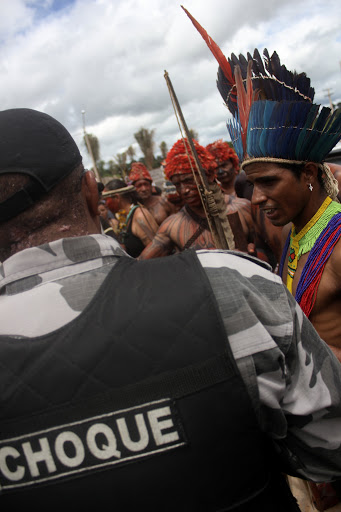
Altamira, Brazil – Some 200 indigenous people affected by the construction of large hydroelectric dams in the Amazon launched an occupation today on one of the main construction sites of the Belo Monte dam complex on the Xingu River in the Brazilian Amazon. The group demands that the Brazilian government adopt effective legislation on prior consultations with indigenous peoples regarding projects that affect their lands and livelihoods. As this has not happened, they are demanding the immediate suspension of construction, technical studies and police operations related to dams along the Xingu, Tapajos and Teles Pires rivers. Shock troops of the military police were awaiting indigenous protestors when they arrived at the Belo Monte dam site, but they were unable to impede the occupation.
The indigenous protestors include members of the Juruna, Kayapó, Xipaya, Kuruaya, Asurini, Parakanã, Arara tribes from the Xingu River, as well as warriors of the Munduruku, a large tribe from the neighboring Tapajós river basin. The indigenous peoples are joined by fishermen and local riverine communities from the Xingu region. Initial reports indicate that approximately 6,000 workers at one of the main Belo Monte construction sites, Pimental, have ceased operations as a result of the protest. The occupation, according to the indigenous communities, will continue indefinitely or until the federal government meets their demands.
Indigenous peoples of the Xingu and Tapajós released this statement [English translation]:
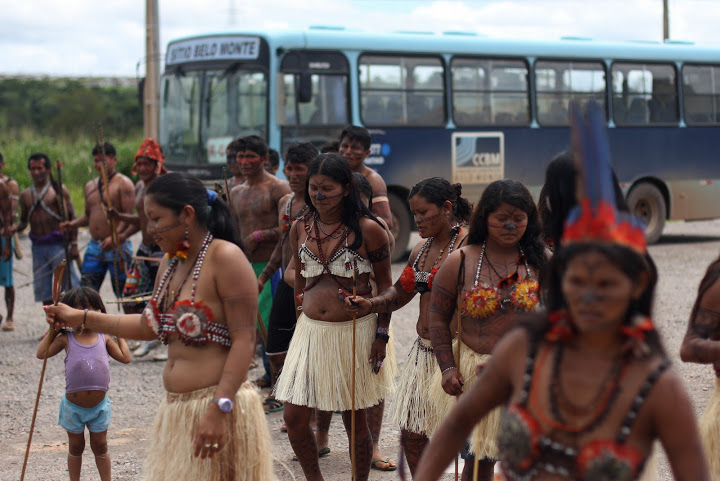
We are the people who live in the rivers where you want to build dams. We
are the Munduruku, Juruna, Kayapo, Xipaya, Kuruaya, Asurini, Parakanã, Arara,
fishermen and peoples who live in riverine communities. We are Amazonian
peoples and we want the forest to stand. We are Brazilians. The river and the
forest are our supermarket. Our ancestors are older than Jesus Christ.
You are pointing guns at our heads. You raid our territories with war trucks
and soldiers. You have made the fish disappear and you are robbing the
bones of our ancestors who are buried on our lands.
You do this because you are afraid to listen to us. You are afraid to hear that
we don’t want dams on our rivers, and afraid to understand why we don’t
want them.
You invent stories that we are violent and that we want war. Who are the
ones killing our relatives? How many white people have died in comparison to
how many Indigenous people have died? You are the ones killing us, quickly
or slowly. We’re dying and with each dam that is built, more of us will die.
When we try to talk with you, you bring tanks, helicopters, soldiers,
machineguns and stun weapons.
What we want is simple: You need to uphold the law and promote enacting
legislation on free, prior and informed consent for indigenous peoples. Until
that happens you need to stop all construction, studies, and police operations
in the Xingu, Tapajos and Teles Pires rivers. And then you need to consult us.
We want dialogue, but you are not letting us speak. This is why we are
occupying your dam-building site. You need to stop everything and simply
listen to us.
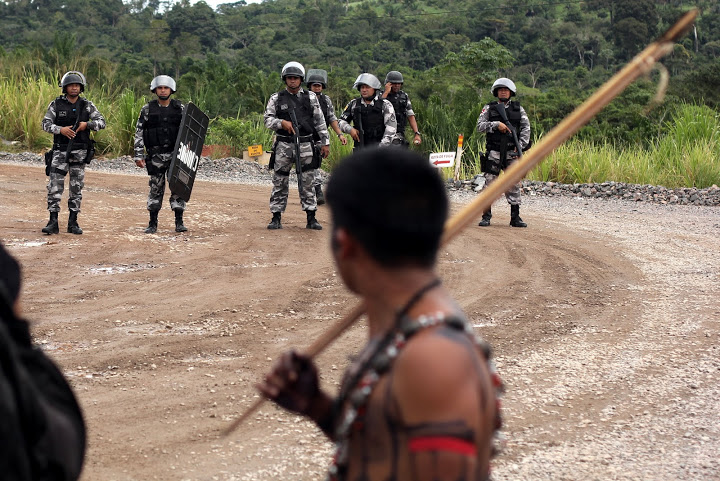
Occupations against the Belo Monte dam complex and mobilizations against other Amazonian dams have become increasingly commonplace. Construction on Belo Monte has been halted on at least seven occasions over the last year due to the efforts of affected indigenous communities and fishermen to call attention to the failures of the Norte Energia dam building consortium and government agencies to comply with the project’s mandated environmental and social conditions. On March 21st, approximately 100 indigenous peoples, riverbank dwellers (ribeirinhos) and small farmers expelled dam workers and occupied the Pimental site, maintained by the Belo Monte Construction Consortium (CCBM). Additionally, recent strikes and protests by dam workers have created additional unrest at CCBM construction sites.
The Munduruku indigenous people and other local communities have mobilized against a cascade of over a dozen large dams slated for construction on the neighboring Tapajós river and its major tributaries, the Teles Pires, Juruena and Jamanxim. One of the first major dams under construction, UHE Teles Pires, has been the subject of lawsuits by Federal Public Prosecutors for lack of prior consultations with the Kayabi, Apiaká and Munduruku indigenous peoples. In recent weeks, the removal of funeral urns of the Munduruku people by dam contractors at the Sete Quedas rapids, considered a sacred site for indigenous tribes, provoked outrage.
Last March President Dilma Rousseff signed Decree no. 7957/2013 allowing the use of the National Guard and other armed forces to ensure that dam construction at places like Belo Monte and technical studies for planned Amazonian dams are not interrupted by indigenous protestors. In April, upon a request of the Ministry of Mines and Energy, approximately 250 federal and military police troops were dispatched to the Tapajós region to ensure continuation of technical studies for the first two large dams scheduled for construction, São Luiz do Tapajós and Jatobá. The military operation came in response to protests from the Munduruku people, whose traditional lands would be directly affected by the two large dams and who have suffered from a history of military operations on their lands.
“Today’s protest demonstrates the relentless resistance of a growing group of united peoples against Belo Monte, Tapajós and other destructive dams throughout the Amazon,” said Leila Salazar-Lopez, Amazon Watch Program Director. “These are the final moments to change course as construction closes in on the Xingu and other lifeline rivers of the Amazon.”
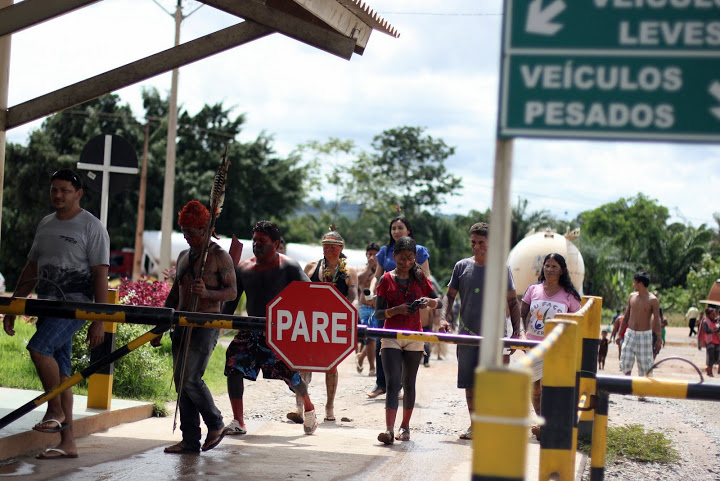
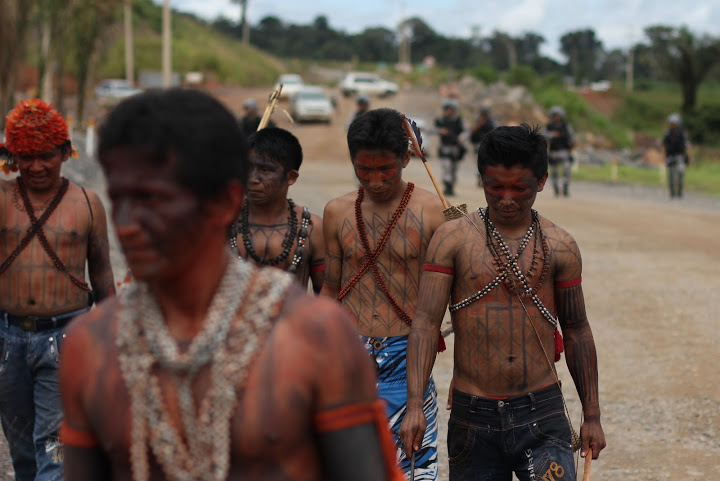
A protester with the group Great Plains Tar Sands Resistance has stopped construction of the Keystone XL pipeline by locking his arm into a concrete capsule buried directly in the pipeline’s proposed path. Fitzgerald Scott, 42, is the first African American to risk arrest while physically blockading TransCanada’s dangerous tar sands pipeline, and the second person to take action this week. On Monday a 61 year old man locked himself to a piece of construction equipment effectively shutting down another Oklahoma pipeline construction site. This week of action, called the “Red River Showdown,” is intended to protect the Red River, which marks the border between Oklahoma and Texas and is a major tributary of the Mississippi.
The site Scott has blockaded is a wetland area where crews are attempting to lay sections of the Keystone XL tar sands pipeline directly into the marshy waters. An undetected pinhole leak at this location would cause cancer causing chemicals to mix directly into the local community water table.
Scott, who has a master’s degree in urban planning from the University of Illinois, Chicago, is a longtime activist for social and environmental justice. While organizing against Keystone over the past five months, Scott has met many people struggling to protect their homes from TransCanada’s abuse of eminent domain.
“I am doing this for the people who don’t have the financial resources to protect themselves from a bully like TransCanada,” explained Scott. “Imagine how much worse it is for them – like the mostly African American neighborhood in Winona, TX, where protesters with the Tar Sands Blockade found holes in welds of the pipeline section that runs right behind a children’s playground, and neither TransCanada nor the government will do anything about it!”
As construction on the southern portion of Keystone XL nears two thirds completion, no regulators or politicians show any willingness to halt the project or even inspect those faulty welds. According to George Daniel, spokesperson for Great Plains Tar Sands Resistance, “Scott’s action sends a clear message: because every other avenue has failed to stop this deadly project, we will blockade – all summer and on into the fall, if that’s what it takes.”
Today’s action comes just a few weeks after the devastating tar sands spill in Mayflower, Arkansas, which has left communities across Oklahoma and Texas terrified that they may be the next victims of reckless industry practices. Survivors of the spill in Mayflower have reported nausea, blurred vision, vomiting, and black outs caused by the same blend of raw tar and poisonous chemical solvents that will be transported through Keystone XL.
UPDATE 9:30 AM Work is still stopped on the easement due to the large amount of police and emergency equipment needed for extraction! Show your support for Fitzgerald here!
UPDATE 9:10 AM: Firefighters have extracted Fitzgerald and he’s now in police custody. Please show your support with a generous donation to his legal fund.
UPDATE 8:49 AM: Another fire rescue vehicle on scene, officer just commanded “everyone not involved in emergency services, back off now!” and workers retreated slightly.
UPDATE 8:30 AM: Half a dozen work trucks, four police cars (3 sheriffs and 1 state trooper), four cops, four firefighters, 2 EMTs, one fire truck and a fire rescue truck on scene. Special fire department equipment truck just arrived; large group of officials crowded around Fitzgerald.
UPDATE 7:42 AM: Sheriff on scene.
In the latest step toward opposing oil pipelines at every port in Canada, the Tsleil-Waututh Nation of Burrard Inlet signed on to the International Treaty to Protect the Sacred yesterday. The nation held a press conference at the Sheraton Wall Centre where newly elected Chief Maureen Thomas signed the document, witnessed by the president of the BC Union of Indian Chiefs Stewart Phillip and national chief of the Assembly of First Nations Shawn Atleo.
The West Coast Oil Pipeline Summit followed the signing. The theme of the event was urgency, with several leaders touching on the need to oppose development at a grassroots level.
Stewart Phillip told reporters and community members assembled that the First Nations of BC are committed to using the legal system to defend their constitutional rights, but that’s not the only strategy they’re using.
“More importantly, we have committed to standing shoulder to shoulder on the land itself.”
Atleo echoed Phillip’s fatigue with the justice system and spoke to the urgent nature of the struggle not just for Aboriginal land rights, but also for environmental protection for everyone.
“This is not just a North American moment you’re witnessing,” he said. “The tipping point we have reached is global.” He also spoke to the inadequacy of the legal avenues available to First Nations to settle land claims and hold the government accountable. He said he doesn’t want to see the courts clogged with cases.
“We don’t need to be pulled down into the weeds of whether consultation has happened.”
Tsleil-Waututh is the first nation whose territories are directly in the path of one of the proposed pipeline projects to sign the treaty. Phil Lane Jr., hereditary chief of the Yankton Sioux nation from South Dakota, said one of the key goals of the treaty is get signatures from all of the nations whose territories are directly affected.
The West Coast Oil Pipeline Summit brought together First Nations leaders from across the province as well as activists and business people from a handful of different alternative energy sectors.
The event was hosted by 2G Group of Companies, a consulting firm whose mandate is to help develop equitable relationships between Aboriginal and non-Aboriginal business ventures.
Economist Robyn Allan gave a keynote speech highlighting the Harper government’s extreme shifts in energy policy from the Kyoto Protocol and plans to limit bitumen exports to the current push to expand tar sands development. She criticized the message that the economy and the environment are on opposite sides of the debate.
“This is a fabricated trade-off designed to put ordinary Canadians against ordinary Canadians,” she said.
A panelist of five speakers discussed different facets of the tar sands debate from the economics of renewable energy development to the effects of climate change around the world.
Ben West, director of the tar sands campaign for Forest Ethics Advocacy, discussed the viability of alternative energy sources and the ways in which conventional methods of development—such as the construction of the Port Mann Bridge to relieve congestion—are often counter intuitive.
“If we could build our way out of congestions, LA would be the best city in the world to drive in,” he quipped. For the cost of the $3 billion bridge, he said, Vancouver could build streetcar infrastructure to serve the better part of the city.
“We’re talking about very real technology, very real solutions.”
Also in attendance was Green Party leader Elizabeth May, who stood up to talk about Monday’s vote in the House of Commons that will determine whether the Canada-China Foreign Investment Promotion and Protection Act (FIPA) will go through.
She said she was impressed by the breadth of information presented throughout the evening particularly fact about how Canada imports the condensate required to transport bitumen.
“I don’t think we’re hearing about it nearly enough that we’re creating dependency on Middle Eastern fossil fuels rather than upgrade it in Alberta and refine it in Alberta,” she said, adding that she’s not seeing the response she’d like from BC politicians.
“Where is Adrian Dix on this project? It does not seem that provincial NDP is opposed to this project and that’s a big problem.”


